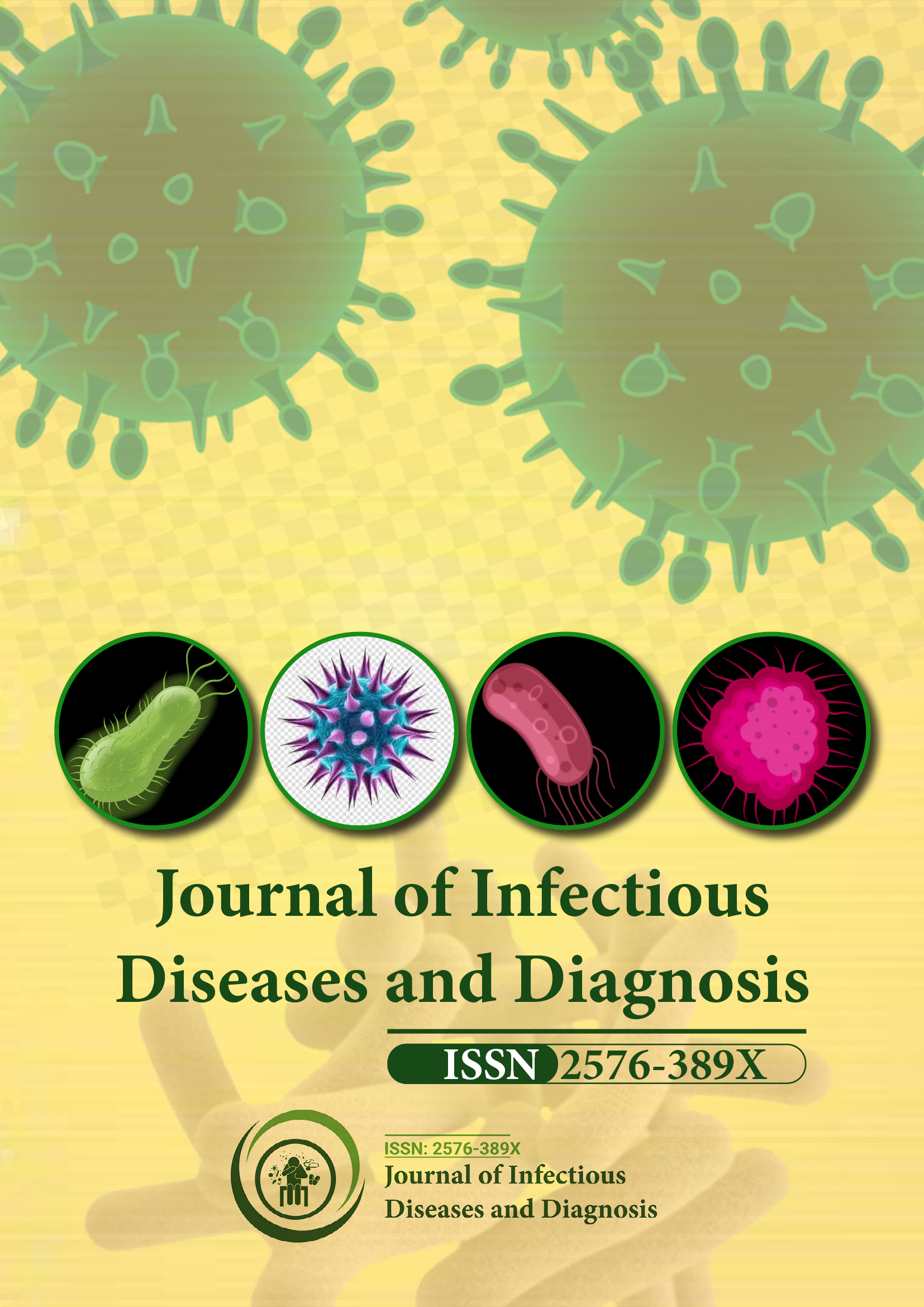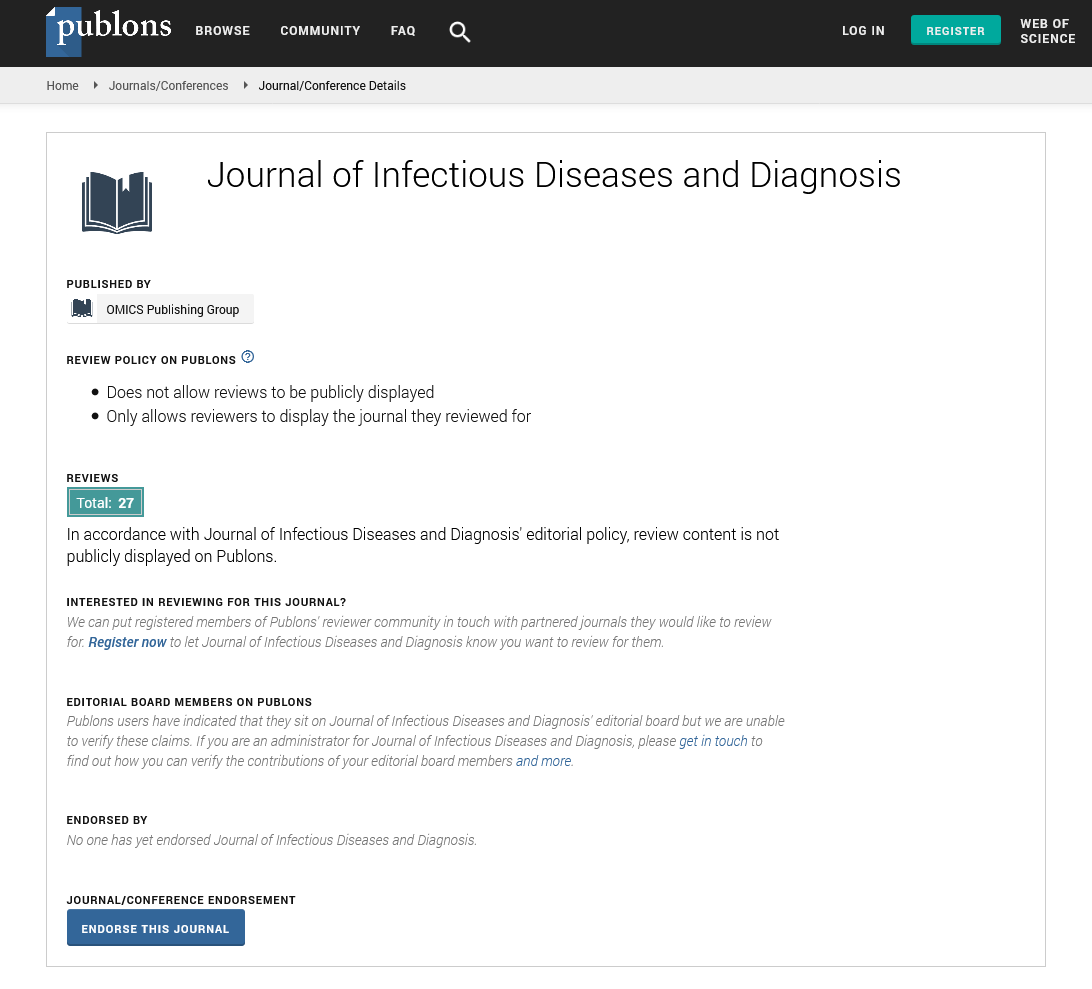Indexed In
- RefSeek
- Hamdard University
- EBSCO A-Z
- Publons
- Euro Pub
- Google Scholar
Useful Links
Share This Page
Journal Flyer

Open Access Journals
- Agri and Aquaculture
- Biochemistry
- Bioinformatics & Systems Biology
- Business & Management
- Chemistry
- Clinical Sciences
- Engineering
- Food & Nutrition
- General Science
- Genetics & Molecular Biology
- Immunology & Microbiology
- Medical Sciences
- Neuroscience & Psychology
- Nursing & Health Care
- Pharmaceutical Sciences
Short Communication - (2024) Volume 9, Issue 2
Serological Signatures: Advancements in Antibody-Based Diagnostics for Infectious Diseases
Laura Lorenzo*Received: 02-Jan-2024, Manuscript No. JIDD-24-24771; Editor assigned: 04-Jan-2024, Pre QC No. JIDD-24-24771 (PQ); Reviewed: 19-Jan-2024, QC No. JIDD-24-24771; Revised: 26-Jan-2024, Manuscript No. JIDD-24-24771 (R); Published: 02-Feb-2024, DOI: 10.35248/2576-389X.24.09.258
About the Study
In the area of infectious disease diagnostics, the evolution of serological testing has been a transformative force, propelled by advancements in antibody-based technologies. This study aims to provide an insightful overview of the latest developments in serological diagnostics, emphasizing the significance of serological signatures and their pivotal role in the accurate detection and monitoring of infectious diseases [1].
Serological diagnostics, centered on the detection of antibodies in patient blood serum, has long been a enduring in the arsenal against infectious diseases. The human immune system produces antibodies, also known as immunoglobulins, in response to the presence of pathogens [2]. Using these antibodies' power for diagnostics has shown to be a flexible and successful strategy.
One notable advancement in serological diagnostics is the refinement of Enzyme-Linked Immunosorbent Assay (ELISA) techniques. ELISA, a classic and widely used method, employs antibodies immobilized on a solid surface to capture and detect specific antigens or antibodies in a patient's serum [3]. Recent innovations in ELISA technology include the development of more sensitive and specific assays, enhancing the accuracy of detection. These advancements have been particularly instrumental in the diagnosis of infectious diseases where low antibody titers might be present during early stages [4].
The advent of recombinant DNA technology has further propelled serological diagnostics into a new era. Recombinant proteins derived from pathogens can be produced in the laboratory, offering highly purified and standardized antigens for serological tests. This not only enhances the specificity of antibody detection but also facilitates the development of serological assays for a wide array of infectious agents [5]. Recombinant protein-based serological tests have proven valuable in the accurate identification of specific pathogens, enabling clinicians to adopt treatment regimens more effectively.
Immunochromatographic assays, commonly known as rapid tests, represent another breakthrough in serological diagnostics. These tests utilize antibodies attached to a strip or membrane to capture specific antigens present in patient samples. The development of point-of-care rapid tests has revolutionized infectious disease diagnosis, particularly in resource-limited settings where immediate results are important. Rapid tests have been instrumental in the diagnosis of diseases such as HIV, malaria, and various viral infections, offering a quick and accessible means of detecting antibodies [6].
The emergence of high-throughput technologies has significantly enhanced the scalability and efficiency of serological diagnostics. Multiplex assays, capable of simultaneously detecting antibodies against multiple pathogens, have become increasingly prevalent. These assays leverage microarray or bead-based technologies to analyze complex serological profiles, providing a more comprehensive understanding of an individual's immune response [7]. Multiplex serological assays contribute to the surveillance of infectious diseases at a population level and aid in the identification of co-infections.
The integration of Artificial Intelligence (AI) and machine learning algorithms into serological diagnostics is poised to elevate the field to new heights. These technologies offer the capability to analyze vast datasets generated by serological assays, identifying subtle patterns and correlations that may escape human analysis [8]. AI-driven serological diagnostics not only enhance the accuracy of disease detection but also have the potential to predict disease outcomes based on specific antibody profiles, ushering in a new era of precision medicine.
In the context of emerging infectious diseases, serological diagnostics play a important role in surveillance and response efforts. The rapid development of serological tests for novel pathogens, exemplified by the response to the SARS-CoV-2 virus causing COVID-19, showcases the adaptability of antibody-based technologies. Serological assays for emerging diseases provide essential information about the prevalence of infections within populations, contributing to public health strategies and vaccine development.
Antibody-based diagnostics are not limited to the identification of pathogens alone. Serological assays are increasingly employed in monitoring vaccine efficacy and immune responses. For example, measuring antibody titers post-vaccination can provide insights into the level of immunity conferred by vaccines [9]. Serological monitoring is particularly relevant in the context of rapidly evolving pathogens, such as influenza viruses, where regular updates to vaccines are necessary to match the changing viral landscape.
However, challenges persist in the field of serological diagnostics. Cross-reactivity, where antibodies may recognize similar epitopes on different pathogens, can lead to false-positive results. Standardization of assays and the development of reference materials are critical to ensure consistency across different laboratories and tests [10]. Additionally, the timing of serological testing is essential, as antibodies may take time to develop following infection, impacting the accuracy of early diagnosis.
Conclusion
In conclusion, serological diagnostics, driven by advancements in antibody-based technologies, continues to be a important aspect in the fight against infectious diseases. The progress in ELISA techniques, the advent of recombinant DNA technology, the rise of rapid tests, and the integration of high-throughput and AI technologies collectively underscore the resilience and adaptability of serological diagnostics. As we navigate the evolving landscape of infectious diseases, serological signatures will remain at the forefront, providing valuable insights for accurate diagnosis, surveillance, and response efforts. The ongoing refinement of antibody-based diagnostics ensures that serology will continue to be an indispensable tool in the investigation to understand and combat infectious diseases.
References
- Huang Y, Lu Y, Huang YM. Obesity in patients with COVID-19: A systematic review and meta-analysis. Metabolism. 2020;113:154378.
[Crossref] [Google Scholar] [PubMed]
- Petersen A, Bressem K, Albrecht J. The role of visceral adiposity in the severity of COVID-19: Highlights from a unicenter cross-sectional pilot study in Germany. Metabolism. 2020;110:154317.
[Crossref] [Google Scholar] [PubMed]
- Anderson MR, Geleris J, Anderson DR. Body mass index and risk for intubation or death in SARS-CoV-2 infection: A retrospective cohort study. Ann Intern Med. 2020;173(10):782-790.
[Crossref] [Google Scholar] [PubMed]
- Elks CM, Francis J. Central adiposity, systemic inflammation, and the metabolic syndrome. Curr Hypertens Rep. 2010;12(2):99-104.
[Crossref] [Google Scholar] [PubMed]
- Deng T, Lyon CJ, Bergin S, Caligiuri MA, Hsueh WA. Obesity, inflammation, and cancer. Annu Rev Pathol. 2016;11:421-449.
[Crossref] [Google Scholar] [PubMed]
- Karczewski J, Sledzinska E, Baturo A. Obesity and inflammation. Eur Cytokine Netw. 2018;29(3):83-94.
[Crossref] [Google Scholar] [PubMed]
- Foulkes AS, Selvaggi C, Shinnick D. Understanding the link between obesity and severe COVID-19 outcomes: Causal mediation by systemic inflammatory response. J Clin Endocrinol Metab. 2021;107(2):698-707.
[Crossref] [Google Scholar] [PubMed]
- McNeill JN, Lau ES, Paniagua SM. The role of obesity in inflammatory markers in COVID-19 patients. Obes Res Clin Pract. 2021;15(1):96-99.
[Crossref] [Google Scholar] [PubMed]
- Chiappetta S, Sharma AM, Bottino V, Stier C. COVID-19 and the role of chronic inflammation in patients with obesity. Int J Obes (Lond). 2020;44(8):1790-1792.
[Crossref] [Google Scholar] [PubMed]
- Hotamisligil GS. Inflammation and metabolic disorders. Nature. 2006;444(7121):860-867.
[Crossref] [Google Scholar] [PubMed]
Citation: Lorenzo A (2024) Serological Signatures: Advancements in Antibody-Based Diagnostics for Infectious Diseases. J Infect Dis Diagn. 9:248.
Copyright: © 2024 Lorenzo A. This is an open-access article distributed under the terms of the Creative Commons Attribution License, which permits unrestricted use, distribution, and reproduction in any medium, provided the original author and source are credited.

